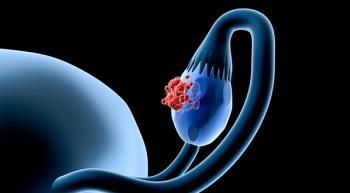
Nivolumab/Ipilimumab Induces Stark Overall Response Rate in Checkpoint Inhibitor–Naïve Merkel Cell Carcinoma
All 24 patients with Merkel cell carcinoma who received nivolumab plus ipilimumab responded to treatment, and 41% achieved complete responses.
All checkpoint inhibitor-naïve patients with Merkel cell carcinoma demonstrated an objective response with the combination of nivolumab (Opdivo) and ipilimumab (Yervoy), according to data from a phase 2 trial (NCT03071406). Notably, the addition of stereotactic body radiation therapy (SBRT) did not impact the objective response rate (ORR), which was 100% (95% CI, 82%-100%).
Among all 24 patients who did not receive prior treatment with a checkpoint inhibitor, 13 received nivolumab/ipilimumab alone and 11 were administered nivolumab/ipilimumab with SBRT. Data presented at the 2022 ESMO Congress showed that 41% of all checkpoint inhibitor–naïve patients achieved a complete response (CR) and 59% had a partial response (PR). Nine percent of patients experienced disease progression following an initial response.
In patients who received prior treatment with a checkpoint inhibitor (n = 26), nivolumab/ipilimumab with or without SBRT produced an ORR of 31% (95% CI, 15%-52%), with a CR rate of 15% and a PR rate of 15%. Additionally, 1 patient had stable disease, 65% of patients experienced progressive disease, and 50% of responders progressed following an initial response. Those given nivolumab/ipilimumab alone and a prior checkpoint inhibitor (n = 12) achieved an ORR of 42% (95% CI, 16%-71%), and those who received nivolumab/ipilimumab plus SBRT and a prior checkpoint inhibitor had an ORR of 21% (95% CI, 6%-51%).
“[The] addition of SBRT did not improve the efficacy of nivolumab/ipilimumab,” Sungjune Kim, MD, PhD, the director of Radiation Oncology Translational Research and an associate member of the Department of Radiation Oncology and Department of Immunology at Moffitt Cancer Center, wrote in a presentation of the data.
The open-label, randomized, phase 2 trial investigated the combination of nivolumab and ipilimumab with or without SBRT in patients aged at least 18 years with recurrent or metastatic MCC who had at least 2 distinct lesions to assess response in the non-irradiated lesion. Patients were also required to have an ECOG performance status of 0 to 1. Patients could not have active brain metastases. Patients were stratified based on prior immunotherapy.
Patients in arm A (n = 25) received 240 mg of nivolumab every 2 weeks plus 1 mg/kg of ipilimumab every 6 weeks. Those in arm B (n = 25) received the same nivolumab/ipilimumab regimen plus 24 Gy/3 fx of SBRT at week 2. Treatment continued until disease progression, unacceptable toxicity, or withdrawn consent.
ORR served as the trial’s primary end point. Secondary end points included overall survival (OS), progression-free survival (PFS), local control, and exploratory biomarkers.
Among all enrolled patients (n = 50), the median age was 73 years (interquartile range, 67-81), 78% of patients were male, and all patients were White. Patients either had an ECOG performance status of 0 (46%) or 1 (54%). Patients had stage IIIB (24%) or IV (76%) disease. Forty-eight percent of patients were naïve to checkpoint inhibitors and 90% were chemotherapy naïve.
Additional data showed that the median duration of response (DOR) was not evaluable (NE; 95% CI, 34-NE) in all patients who were naïve to checkpoint inhibitors. For those with prior exposure to checkpoint inhibitors, the median DOR was 11 months (95% CI, 5-NE). In arm A, the median DORs in the checkpoint inhibitor–naïve and–exposed populations were NE (95% CI, 34-NE) and 15 months (95% CI, 7-NE), respectively. In arm B, the median DOR in these populations were NE and 5 months (95% CI, 3-NE), respectively.
The median PFS was NE among checkpoint inhibitor–naïve patients in both arms. Those with prior checkpoint inhibitor treatment in arms A and B experienced a median PFS of 4.2 months and 2.7 months, respectively. The median OS was NE for both arms among patients without prior checkpoint inhibitor exposure. Those in arm A with prior checkpoint inhibitor treatment achieved a median OS of 14.9 months compared with 9.7 months for those in arm B.
Regarding safety, 54% of all patients experienced at least 1 grade 1/2 treatment-related adverse effect (TRAE). The rates of grade 1/2 TRAEs in arm A and arm B were 44% and 64%, respectively. Grade 3 TRAEs occurred in 26% of all patients, including 28% of those in arm A and 24% of those in arm B. Grade 4 TRAEs were reported in 10% of all patients, including 12% of those in arm A and 8% of those in arm B.
Overall, 8 patients discontinued treatment due to toxicity.
Reference
- Kim S, Wuthrick E, Blakaj DM, et al. Combined nivolumab and ipilimumab with or without stereotactic body radiation therapy for advanced Merkel cell carcinoma. Ann Oncol. 2022;33(suppl 7):S1409-S1410. doi:10.1016/j.annonc.2022.08.041
Newsletter
Knowledge is power. Don’t miss the most recent breakthroughs in cancer care.
























































































